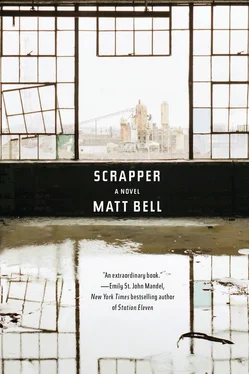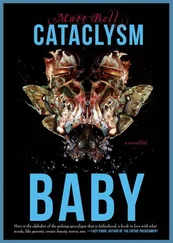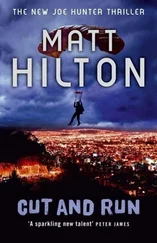He woke up, he trained, he sparred, he put his fists against the speed bag and the heavy bag and against toughened skin. He relearned a forgotten vocabulary, better ways of getting strong, to go past bench presses, shoulder presses, squats, and dead lifts, ways to pack on mass, power cleans, dumbbell snatches, power jumps, ways to pack on speed, explosiveness, fast-twitch muscle. Ballistic movements. There were ways he could train himself, could work out at home too, pull-ups and push-ups, box runs, medicine balls. At night he closed his eyes and imagined he could hear his muscles stretching and in the morning when he woke up he saw he was bigger, so slightly enlarged, cut with a bit more bark beneath the bruises.
The others ate creatine, protein, ZMA, vitamins you could choke on. Some evenings Kelly swallowed pills smuggled from the girl’s purse and they thickened his veins until he thought if he didn’t keep moving he might turn to stone. With them he saw with some new dilation, how the streetlights glowed big as suns. The buildings never wavered or blurred but perhaps they throbbed. If he saw a man on the street who looked like the man who mugged him, then he raised his phone, took a picture of the man. The phone’s digital zoom was useless and as it brought him closer it showed him less: vague impressions, the color of skin, the shape of the skull, a slash or curve of expression. At an office-supply store he plugged his phone into a printer, ran color prints of every face he’d gathered. At home, Kelly taped the prints into the case notes where no one would find them, where the pictures began to color whatever pages they opposed.
Everything he added to his life became another repetition, a way of filling the endless everyday. He went to work, pushed his wheelbarrow down long industrial hallways, carried the broken fixtures from every bathroom, removed everything too valuable to leave for when the machines came to crush the building. The foreman trained him on other tasks, let him get a taste of the excavator. When they cleared one block they found a steel swimming pool dug into the dirt and the foreman showed Kelly the push and pull of the levers, how to reach down to puncture the pool’s floor, to crumple its steel walls. Everything they encountered could be removed but Kelly was starting to think about what was closest to permanence. About cement, masonry, stonework. About close enough. It would require new skills but if the need emerged he had time, ambition, the will to learn.
Maybe it was enough to hide the deed between the gaps of attention. To put an action into a space where no one wanted to look.
Kelly made the boy a key so he could come and go as he pleased. He picked the boy up from school and because the boy hadn’t eaten lunch Kelly took him out for fast food, filled the table between them with paper-wrapped burgers, red-boxed fries. When they ate together the boy often ate his food out of order: he would start with dessert, not finishing his burger because he’d already had a shake, a paper-boxed apple pie. The inversion of norms, left over from the last time the rules disappeared and so maybe the rules were gone. They sat in a booth at the back of the dining area and behind them was a glass wall cordoning off an indoor playground. Someone had soundproofed the glass so you couldn’t hear the children playing. Every time Kelly looked over his shoulder there was another child there, shoeless or sockless, running across the floor, disappearing into a plastic tube. The smallest steps of the smallest children. There were cameras everywhere but the only one they warned you of was the one in the playground, a guardian behind smoky glass.
Kelly raised his phone, snapped a picture of the boy’s face, flushed and full over the remains of his meal.
Because you’re my friend, Kelly said.
Kelly dropped the boy off at his mother’s then returned to where he had rescued the boy to find the blue house demolished, removed. Kelly squatted, graded the ground with his gloves, found nothing except a tenth of an acre of bare earth and dirty snow, not a single nail, a single screw. He knew the basement walls were gone too, torn out in dirty chunks, like he’d removed the swimming pool in another part of the zone. They would have used an excavator to dig a ramp, then sent the excavator to break the walls, the cement flooring. The machine digging into the hard and frozen earth, the house more joined to the dirt than in any other season.
If there was any physical reminder of the boy’s captivity it was gone. Kelly lay down in the snow, let its shivery melt radiate into his clothes until his teeth chattered, until his skin burned. Later in the night he dreamed he heard a smile in the dark: a faceless man spoke up in the offenseless volume of the hopeless, testified in favor of his acquittal. There weren’t handcuffs but duct tape held sturdy enough in the deep. Despite the mask Kelly wore he understood the man fine as long as he was standing right beside the chair. He was sure the man had had a face but it wasn’t visible. He wasn’t sure he could hurt the man but how could he let him go.
LATER PERHAPS there would be all kinds of perverse accusations but you didn’t think they would be true. Certainly there was no touching beyond the necessary. But if the accusations were true how surprised could you be. You did not know yourself well. You guessed, conjectured. You had urges but not toward the boys. You had urges but you didn’t understand where they originated.
In the faces of others you most often saw a certain kind of blankness, neither sad nor happy nor angry. A lack of gladness, a lack of sorrow. You saw on the television a show about people whose brain injuries left them unable to recognize emotion in expressions and you thought you were probably one of those people.
But where was your injury.
The watching was an exhaustion. Of the boy and of you. You had not expected this. You couldn’t watch continuously but the longer you watched the greater the unfolding of the boy. It took time to get beneath the surface. You had to watch and you had to be sure the boy knew you were watching. At first the boys were merely confused, unsure of who you were, why you had picked them. There was something you wanted and the more the boy showed you the longer you kept the boy. The best boy had long since come and gone but others had been good enough. Their eyes couldn’t stay afraid forever. There was curiosity. One spoke and told you he would never forget your face but everyone had forgotten you and if this boy did not then he would be the first.
When the watching was over you didn’t want to see the boy ever again. There were a few ways to ensure you would not.
Boys ran away, disappeared for reasons not related to being taken, to being watched, what came after the watching. The getting gone. This was why you took boys and not girls. If you took girls, then no one would ever believe they had gone missing on their own.
AT THE GYM, THE RELATIVITY of age: the age of a thirty-four-year-old man. How there was almost no one older worth putting your hands on. It was folly for Kelly to be in the ring with these monsters of youth but he wasn’t trying to compete, didn’t need to ever fight a real match, the nine minutes of amateur spectacle. All he wanted to do was to throw himself against their strength. They knocked him down but he knocked them down too. The ones who refused to spar with him he called names, goading their pride until they split his lips, bruised his eyes, filled his skin with the language of their rebuttals. He turned an ankle at a jobsite and then he had to limp around the gym, push through his disadvantages. In his apartment he imagined filling his tub with ice, filled a tumbler instead, put ice packs on his hands and whiskey in his stomach and vowed tomorrow he would go back for more. Dead lifts, squats, lunges. The seated row, the shoulder shrug, the dozens of pull-ups he’d become capable of again.
Читать дальше












